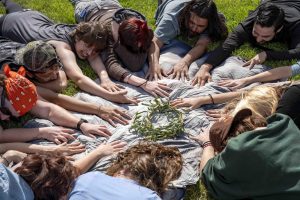The Rundown: Meningococcal Vaccinations
March 9, 2017
Almost every OSU student has heard about the third case of a student being infected with Meningococcal B case this school year. In response, the OSU Student Health Services (SHS) has plans in place for vaccinating students, particularly those who live on campus. BD was able to contact a couple of the doctors at SHS and receive some answers for students about the vaccine.
Courtesy of Doctor Jeff Mull, the SHS Medical Director, and Doctor Connie Hume-Rodman, SHS Director of Clinical Services, below is the complete run-down every student needs for the Meningococcal B vaccine.
1. Who should receive the MenB vaccine?
Students age 25 years and under, especially those living in residential halls or members of fraternities and sororities.
2. How much does the MenB vaccine cost?
Without any insurance coverage, the cost is $182 per Bexsero shot. We urge students to come to the vaccine clinic even if they are uninsured or think their insurance might not cover it. Part of the check-in process is to figure out each student’s insurance coverage, and to offer options for students who are not or may not be covered.
3. What kind of side effects should students who receive the vaccine should students keep an eye on?
It would be rare to develop an allergic reaction, but that is why we ask students to wait for 15 minutes after getting the shot. More common side effects within the next few days might include pain and/or redness at the shot site, body aches, headache, nausea, fatigue and/or low grade fever.
4. Where and when should students receive the vaccine?
McAlexander Fieldhouse on between 9 am and 6 pm on Wednesday 3/8 and Thursday 3/9. If you absolutely cannot make it during these times, come to Student Health Services at Plageman Building.
5. Which form of the vaccine is a better choice for students, the Bexsero or Trumenba?
Both provide equal protection. Bexsero requires 2 shots a month apart to achieve best possible protection, while Trumenba requires 3 shots over 6 months. For the purposes of achieving maximal protection, the Bexsero would be quickest. This is the shot we are giving at the vaccination clinic. It’s really important that students come back for the second Bexsero shot to complete the series. For any students who may have previously received Trumenba, it’s also important to finish that series with a second and third shot. We have both vaccines available. Note that Bexsero and Trumenba are not interchangeable. Finish whichever one you start.
6. Why does the required meningococcal required vaccine not sufficient for this protection from these cases of the meningococcal?
The standard Meningococcal vaccine recommended by the Centers for Disease Control (CDC) for all adolescents and young adults covers 4 strains of Meningococcus, but not group B. Group B is the strain that three OSU students have had since November 2016. Group B vaccine is only recommended for certain medical conditions or in the event of a CDC ‘designated outbreak’.
7. Why is it important for students to receive this vaccine?
While this disease is not easily spread from person to person, it is very serious, and at times deadly. This is a pro-active measure that students can take to protect themselves, knowing we’ve now had three cases amongst our student population. It is very important to receive all the shots in the series to reach maximal protection.
8. What’s the best way to protect one’s self from contracting MenB?
In addition to getting this vaccine, do not:
share eating utensils,
share drinking containers (including common punch bowls),
smoking devices.
To lower your risk, you should also avoid smoking altogether since that increases the likelihood of getting this disease. Know that intimate contact can also spread the disease. Basically, the bacteria travel in saliva and spit.
9. If a student begins to feel ill with symptoms similar to MenB, what should he/she do?
Seek care immediately, at Student Health Services during our regular hours. Note that our hours are Monday through Friday only, 9 am – noon during breaks. You can also go to a local urgent care center or the nearest emergency department.
10. Any other thoughts or things we should know?
If you are age 25 or under, especially if you live on campus or are part of a fraternity or sorority, come to McAlexander Fieldhouse Wednesday 3/8 or Thursday 3/9 and bring your friends. This is the best way to prevent any more cases of this disease amongst our students!
Make sure to take advantage of the opportunity to receive this much needed vaccine to protect yourself and your friends!
Photography by Noah Silliman (via unsplash.com)






